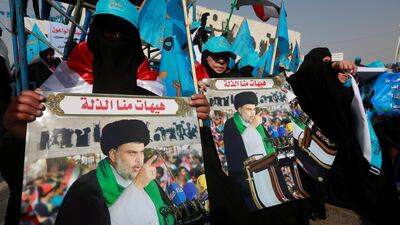Moqtada Al Sadr has rejected former Iraqi prime minister Nouri Al Maliki's call for an all majority government ahead of the country’s parliamentary elections on Saturday.
The populist preacher has defied his clerical rivals and opted to campaign for the polls alongside rival enemies - the communist party, vowing to fight corruption, improve public services and to develop a reform system.
"Some politicians believe that they can have absolute majority policy to continue with their corrupt strategies, Mr Al Sadr said, in an apparent dig at the former premier.
Mr Al Maliki - now a vice president and close ally of Iran - has been severely diminished because of Iraq's losses to ISIS, but is seeking a return as prime minister.
He was blamed for the widespread of corruption and sectarian policies that eventually contributed to the rise of ISIS.
___________
Iraq's top Shiite cleric hints at opposition to Maliki
___________
Mr Al Sadr, however, has positioned himself as a political counterweight against Iranian influence in Iraq, and as a champion of reform.
Shiite religious parties have come to play a greater role in the years since the US-led 2003 invasion of Iraq that toppled long-time dictator Saddam Hussein.
Mr Al Sadr’s calls are supported by Mr Al Maliki's fiercest competitor, Ayyad Allawi.
Mr Allawi, who is also a vice president of Iraq, claims that an all majority government would heighten sectarian tensions in the county.
"Politicians try to camouflage it by saying it's a political majority, but we all know that its sectarian. We don't believe in this at all," he told The National in a recent interview.
Iraqi voters will be choosing from among 7,000 candidates competing for 329 seats in parliament.


